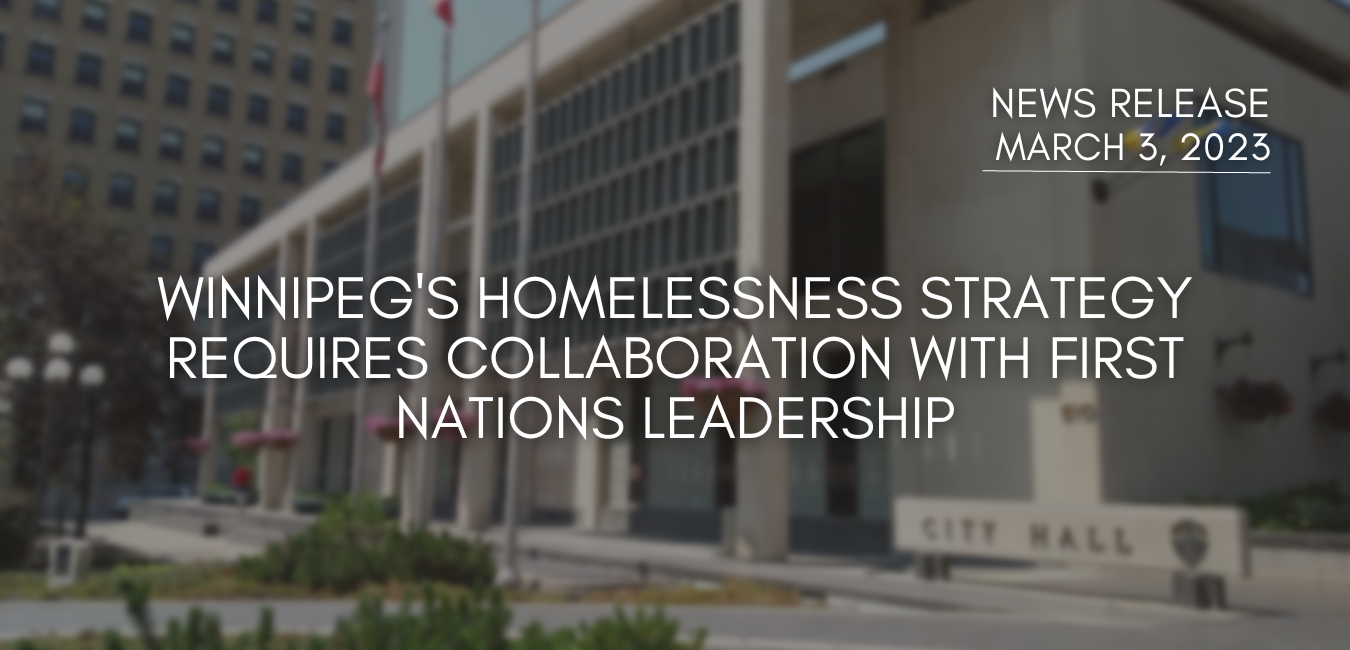Winnipeg’s Homelessness Strategy Requires Collaboration with First Nations Leadership

March 3, 2023
Treaty One Territory, Manitoba
AMC Communications
Treaty One Territory, Manitoba –The Assembly of Manitoba Chiefs (AMC) releases the following statement in response to Mayor Scott Gillingham’s inaugural State of the City address during the Winnipeg Chamber of Commerce Annual State of the City event.
Mayor Gillingham focused on four main pillars: homelessness, safety, downtown improvements, and economic development. The strategy includes allocating $1 million of the 2023 budget towards creating more 24/7 safe spaces. The plan also calls for a city peace officer unit to work on the transit system to address the growing safety concerns of passengers. Mayor Gillingham announced both initiatives in response to concerns about the ever-increasing violence and homelessness rates in Winnipeg. However, neither strategy adequately works to dismantle the underlying realities and circumstances contributing to the increased rates of violence and homelessness.
“Homelessness and violence are not a ‘First Nations issue,'” Grand Chief Cathy Merrick said. “These issues are the product of a colonial system that cannot ethically serve in the best interests of First Nations people, so why does this government continue to use its methods and systems to remedy the problems that same system created and continues to create?”
AMC agrees with the comment made by Mayor Gillingham that we must move beyond emergency support and focus on offering long-term support. First Nations leadership remains committed to providing First Nations-led solutions to the ongoing issues facing our people. On Dec. 1, 2021, N’Dinawemak: Our Relatives Place officially opened in partnership with End Homelessness Winnipeg (EHW), AMC – First Nations Family Advocate Office (FNFAO), Eagle Urban Transition Centre (EUTC), Community Helpers Unite, Saabe Peace Walkers, and Aboriginal Health and Wellness and Downtown Community Safety Partnership (DCSP).
The Indigenous-led shelter offers a drop-in warming area and a safe place to sleep while providing culturally appropriate services and support for unsheltered relatives. Since its inception, N’Dinawemak has successfully moved beyond basic emergency support to offering meaningful supports to address poverty, homelessness, complex medical needs, housing support, and building employment skills.
“We know that First Nations experience homelessness at rates disproportionate to other members of society,” Grand Chief Cathy Merrick said. “Our people will continue to dominate some of the worst statistics until there are First Nations-led solutions to the myriad of issues plaguing our people. In under 1.5 years, since the AMC has provided support at N’Dinawemak, we have taken a different approach to providing services to unsheltered relatives. By listening and coming from a place of understanding, we can provide support services and resources to meet their needs. However, more work is needed to address the root causes of homelessness.”
For more information, please contact:
Communications Team
Assembly of Manitoba Chiefs
Email: media@manitobachiefs.com
About the Assembly of Manitoba Chiefs
The AMC was formed in 1988 by the Chiefs in Manitoba to advocate on issues that commonly affect First Nations in Manitoba. AMC is an authorized representative of 62 of the 63 First Nations in Manitoba with a total of more than 151,000 First Nation citizens in the province, accounting for approximately 12 percent of the provincial population. AMC represents a diversity of Anishinaabe (Ojibway), Nehetho / Ininew (Cree), Anishininew (Ojibwe-Cree), Denesuline (Dene) and Dakota Oyate (Dakota) people.